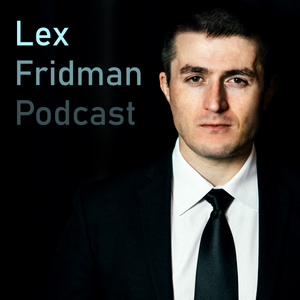
The biographer who inspired Christopher Nolan’s blockbuster film Oppenheimer
11/21/23 • 40 min
This episode of the Physics World Stories podcast features an interview with Kai Bird, co-author of the book that inspired the recent blockbuster film Oppenheimer, directed by Christopher Nolan. Winner of the 2006 Pulitzer Prize in Biography, American Prometheus: the Triumph and Tragedy of J. Robert Oppenheimer is an exploration of the brilliant and enigmatic physicist who led the project to develop the world’s first atomic weapons.
Oppenheimer is a fascinating but complicated character for a biographer to tackle. Despite excelling in his leadership of the Manhattan Project, Oppenheimer’s conscience was torn by the power he had unleashed on the world. “Now I am become Death, the destroyer of worlds,” is the line he infamously recalled from the Hindu scripture the Bhagavad Gita, upon witnessing the Trinity Test fireball in 1945.
Parallels between the nuclear dawn and AI today
The physicist’s relationship with politics was also fraught and difficult to define. Oppenheimer held personal connections with Communist Party members prior to the Second World War, and spent the post-war years warning against nuclear proliferation – provoking the ire of McCarthy Era politicians and ultimately having his security clearance revoked in 1954.
Unsurprisingly, American Prometheus is receiving a resurgence of interest following the success of Nolan’s film. Readers are fascinated once again with the dawn of the nuclear age, which Bird says has parallels with where we are today with AI and the threat of climate change. He also sees the political threads from McCarthyism to the post-truth tactics and populist playbook deployed in US politics today.
As always, the podcast is presented by Andrew Glester and you can read his review of the film Oppenheimer, as well as a recent opinion piece by Robert P Crease “What the movie Oppenheimer can teach today’s politicians about scientific advice“.
This episode of the Physics World Stories podcast features an interview with Kai Bird, co-author of the book that inspired the recent blockbuster film Oppenheimer, directed by Christopher Nolan. Winner of the 2006 Pulitzer Prize in Biography, American Prometheus: the Triumph and Tragedy of J. Robert Oppenheimer is an exploration of the brilliant and enigmatic physicist who led the project to develop the world’s first atomic weapons.
Oppenheimer is a fascinating but complicated character for a biographer to tackle. Despite excelling in his leadership of the Manhattan Project, Oppenheimer’s conscience was torn by the power he had unleashed on the world. “Now I am become Death, the destroyer of worlds,” is the line he infamously recalled from the Hindu scripture the Bhagavad Gita, upon witnessing the Trinity Test fireball in 1945.
Parallels between the nuclear dawn and AI today
The physicist’s relationship with politics was also fraught and difficult to define. Oppenheimer held personal connections with Communist Party members prior to the Second World War, and spent the post-war years warning against nuclear proliferation – provoking the ire of McCarthy Era politicians and ultimately having his security clearance revoked in 1954.
Unsurprisingly, American Prometheus is receiving a resurgence of interest following the success of Nolan’s film. Readers are fascinated once again with the dawn of the nuclear age, which Bird says has parallels with where we are today with AI and the threat of climate change. He also sees the political threads from McCarthyism to the post-truth tactics and populist playbook deployed in US politics today.
As always, the podcast is presented by Andrew Glester and you can read his review of the film Oppenheimer, as well as a recent opinion piece by Robert P Crease “What the movie Oppenheimer can teach today’s politicians about scientific advice“.
Previous Episode

Physics for fairness: tackling global sustainability challenges through science
This year, 2023, marks the half-way point to the 2030 deadline for achieving the 17 Sustainable Development Goals (SDGs). Recent global developments, including conflicts and the COVID-19 pandemic, make SDGs such as “Zero Hunger” and “Reduced Inequalities” seem more daunting than ever. The scale of the challenge is clear; but professionals working on the frontline of sustainable development are as committed as ever to enabling positive change.
That includes physicists and engineers, and July 2022 – July 2023 was the International Year of Basic Sciences for Sustainable Development. In this episode of the Physics World Stories podcast you will hear from with two physical scientists whose careers enable them to apply their scientific knowledge to tackling inequities. As always, the episode is hosted by Andrew Glester.
Ruhi Chitre is an intern at UNESCO, Paris, who was previously president of the International Association of Physics Students. Chitre believes that international policymaking can be strengthened by the contribution of more people with backgrounds in fundamental science, not least because they have a nuanced understanding of the concept of risk.
Later in the episode, you will hear from Destenie Nock, a civil & environmental engineer at Carnegie Mellon University in the US. Nock’s research includes looking for patterns in energy usage that can reveal local inequalities, such as correlations between household incomes and use of heating in winter. In her teaching, Nock encourages her students to take engineering back to its fundamental purpose – to think about how innovation can improve livelihoods.
Nock is among the invited speakers at Environmental Research 2023, a series of free-to-attend virtual events on 16 October – 23 November hosted by IOP Publishing (which publishes Physics World).
Next Episode

Radiant chills: the revolutionary science of laser cooling
Over the past half century, laser cooling has revolutionized atomic, molecular and optical physics. Laser cooling of atoms and ions has enabled dramatic leaps in the precision of atomic clocks, allowing new tests of fundamental physics and potential improvements in clock-based navigation via the Global Positioning System. Now it is also laying the foundations for quantum computing with atoms and ions.
In this episode of Physics World Stories, you can enjoy a vibrant tour through the history of laser cooling with Chad Orzel, a popular-science author and researcher at Union College in the US, who is in conversation with Andrew Glester. Orzel describes the key research breakthroughs – which have led to several Nobel prizes – but also the personal stories behind the discoveries, involving physics titans such as Hal Metcalf, Bill Phillips and Steven Chu.
You can learn more about this topic via a trilology of features that Chad Orzel has written for Physics World. The final instalment will be available in January and you can already read the first two articles:
Physics World Stories Podcast - The biographer who inspired Christopher Nolan’s blockbuster film Oppenheimer
Transcript
- Physics - World. Hello and welcome to the Physics World Stories podcast. I'm Andrew Gluster. And in this episode, we're gonna be hearing from Kai Bird, who, along with Martin Sherwin won the Pulitzer Prize for their biography, American Prometheus, the Triumph and Tragedy of Jay Robert Oppenheimer. The book has since been read by Christopher Nolan, and it was that book that inspired the film Oppenheimer and will hear Kai's thoughts on Nolan's film, as well as some in
If you like this episode you’ll love
Episode Comments
Generate a badge
Get a badge for your website that links back to this episode
<a href="https://goodpods.com/podcasts/physics-world-stories-podcast-197299/the-biographer-who-inspired-christopher-nolans-blockbuster-film-oppenh-37424266"> <img src="https://storage.googleapis.com/goodpods-images-bucket/badges/generic-badge-1.svg" alt="listen to the biographer who inspired christopher nolan’s blockbuster film oppenheimer on goodpods" style="width: 225px" /> </a>
Copy




